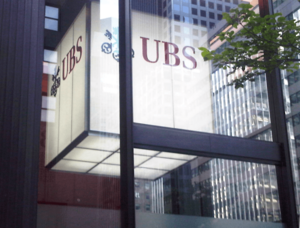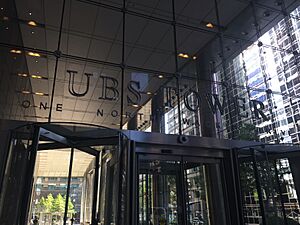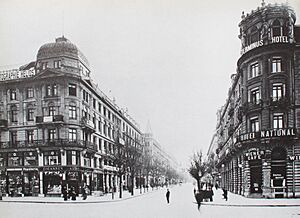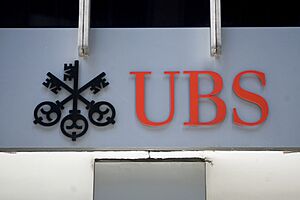UBS facts for kids
 |
|
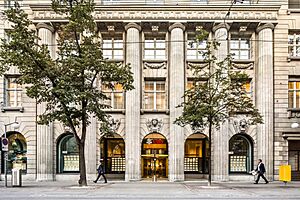
Münzhof, the company's headquarters in Zurich, Switzerland
|
|
|
Formerly
|
Union Bank of Switzerland (1862–1998) |
|---|---|
| Public | |
| Traded as | |
| ISIN | [https://isin.toolforge.org/?language=en&isin=CH0244767585 CH0244767585] |
| Industry | Financial services |
| Predecessor |
|
| Founded | 29 June 1998 (through the merger of Union Bank of Switzerland and Swiss Bank Corporation) |
| Headquarters | Zurich and Basel, Switzerland |
|
Area served
|
Worldwide |
|
Key people
|
|
| Products |
|
| Revenue | |
|
Operating income
|
|
| AUM | |
| Total assets | |
| Total equity | |
|
Number of employees
|
128,983 (2024) |
| Subsidiaries | Credit Suisse |
| Capital ratio | |
| Rating | S&P: A+ Moody's: Aa2 Fitch: AA- |
| Footnotes / references UBS Institutional Reporting as of: end of 2024 |
|
UBS Group AG (often called UBS) is a big Swiss company that offers many financial services. It has its main offices in Zurich and Basel, Switzerland. UBS is the largest bank in Switzerland and the biggest private bank in the world.
UBS helps people manage their money, offers banking services, and works with investments for individuals, companies, and large organizations. It is known for keeping client information very private. The bank also has many secure storage places for valuable items like gold. In 2023, UBS bought another large Swiss bank, Credit Suisse, in an emergency deal. This made UBS even bigger, managing over $5 trillion in assets.
UBS is considered one of the most important financial institutions globally. It is also a major player in the investment banking world.
How UBS Started
UBS began in 1862 as the Bank in Winterthur. This was part of a trend where many big Swiss banks were created in the late 1800s. The name came from the town of Winterthur, which was an industrial center in Switzerland. Around the same time, in 1854, six private bankers in Basel started the Swiss Bank Corporation (SBC). They helped Swiss railroad and manufacturing companies with their money needs.
In 1912, the Bank of Winterthur joined with Toggenburger Bank to form the Union Bank of Switzerland (UBS). This new bank grew quickly after a law in 1934 made Swiss banking secrecy official. For many years, Union Bank of Switzerland and Swiss Bank Corporation (SBC) were competitors. Then, in 1998, they decided to merge and become one company, simply called "UBS".
The name 'UBS' comes from the Union Bank of Switzerland, one of its older parts. However, like many famous brands that used to be abbreviations, UBS is no longer an acronym. It's just the company's name. Over 370 financial companies have become part of today's UBS since 1862.
During the 2008 financial crisis, UBS faced big losses. In 2011, the bank was affected by a trading scandal that resulted in a large loss. After these events, UBS decided to focus more on helping people manage their wealth.
How UBS is Organized
UBS is a joint-stock company, which means its ownership is divided into shares. These shares are traded on the SIX Swiss Exchange and the New York Stock Exchange (NYSE). By December 2020, UBS had offices in major financial cities around the world, like New York, London, and Singapore.
UBS has offices in 50 countries and employs many people. About 30% of its employees work in the Americas, 30% in Switzerland, and the rest are spread across Europe, the Middle East, Africa, and Asia Pacific. The bank has a strong presence in the United States. Its main offices for investment banking are in New York City, and for private wealth management in Weehawken, New Jersey.
The company has four main business groups:
- Global Wealth Management
- Personal & Corporate Bank
- Asset Management
- Investment Bank
UBS is a top provider of banking services for individuals and companies in Switzerland. It has been a leader in the Swiss market since 2009. In November 2014, UBS Group AG shares started trading as a new holding company on the New York Stock Exchange and the SIX Swiss Exchange.
Global Wealth Management
This part of UBS helps wealthy individuals around the world with their money. It offers advice, investment products, and services. As of 2018, UBS manages the most private wealth globally, with many of the world's richest people as clients.
UBS provides services like helping people buy and sell investments, managing their money, and offering advice on their portfolios. It also offers various savings and investment products. This business is divided into regions, with separate teams for the U.S. and other international markets. Most of the money managed comes from Europe and Switzerland, with a significant portion from Asia-Pacific.
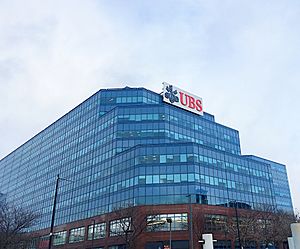
UBS Wealth Management has offices in over 40 countries. In Switzerland, UBS Swiss Bank offers full retail banking services like checking accounts, savings accounts, credit cards, and home loans for individuals. They also help small businesses and corporate clients with their money.
UBS's wealth management in the Americas grew from the former Paine Webber brokerage business. This division helps very wealthy clients manage their money. UBS was recognized as the "Best Bank for Wealth Management in North America" in 2017.
Personal and Corporate Banking
This division of UBS provides financial products and services to individuals, companies, and large organizations in Switzerland. It is a very stable and profitable part of the bank. UBS is a leader in lending to individuals and companies in Switzerland. It serves many pension funds and most of the largest Swiss corporations and banks.
The products offered include cash accounts, payment services, savings and retirement plans, investment funds, and home loans. This division helps other parts of UBS by referring clients and helping them grow their wealth. It has 279 branches in Switzerland, 1,250 ATMs, and offers digital banking services to 2.5 million personal banking clients.
UBS Asset Management
UBS Asset Management offers many ways to invest, including stocks, bonds, currencies, and real estate. When UBS and SBC merged in 1998, their asset management operations combined. The investment teams merged in 2000, and by 2002, they became UBS Global Asset Management.
By the end of 2018, UBS Asset Management was responsible for managing US$781 billion in investments. With about 2,300 employees in 23 countries, it is the largest mutual fund manager in Switzerland and a leading fund house in Europe. It has main offices in major cities like Chicago, London, and New York.
In 2017, UBS changed how it organized its investment teams to create more systematic products and services for clients. It also formed a new area for Real Estate and Private Markets. In February 2017, UBS Asset Management sold its fund administration units in Luxembourg and Switzerland to Northern Trust Corporation. This deal helped Northern Trust expand and become a major fund administrator in those countries.
In April 2025, UBS Asset Management changed its rules for some sustainability funds. These funds can now invest in companies that make conventional weapons. This change shows a shift in how investors are thinking, especially with rising global tensions. UBS still avoids controversial weapons like cluster bombs.
UBS Investment Bank
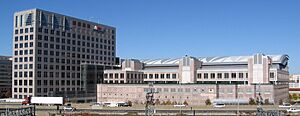
UBS Investment Bank offers services related to stocks, other financial products, and research. This includes helping with stocks, interest rates, credit, foreign exchange, and precious metals. By the end of 2018, this division had 5,205 employees in 33 countries, with main offices in cities like London, New York, and Zurich.
This part of the bank also advises companies, governments, and investors on how to access capital markets. UBS Investment Bank was previously known as UBS Warburg and Warburg Dillon Read. The Investment Banking Department (IBD) helps with mergers and acquisitions, stock offerings, and debt offerings.
The Sales & Trading division helps clients buy and sell stocks, bonds, and currencies. After an expansion in 2002, the trading floor was very large, covering 103,000 square feet. Over $1 trillion in assets are traded here every day.
Competition
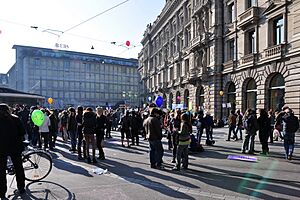
Globally, UBS competes with the largest investment banks, especially those in the "Bulge Bracket" group. Before buying Credit Suisse in 2023, UBS was often compared to it. A 2018 study showed UBS was among the top 10 investment banks worldwide.
- In Switzerland, UBS competes with local banks like Zurich Cantonal Bank and Raiffeisen Bank International.
- In Europe, it competes with large banks such as Deutsche Bank and HSBC.
- In the United States, UBS competes with major American banks like Citigroup, Bank of America, and Goldman Sachs.
More About UBS's History
UBS's history goes back to 1862, when the Bank in Winterthur was founded. When Union Bank and SBC merged, they wanted to call the new company "United Bank of Switzerland." However, they chose "UBS" because another Swiss company already used a similar name. So, UBS is no longer an acronym; it's just the company's brand. Its logo, which has three keys, came from SBC. These keys represent confidence, security, and discretion.
Swiss Bank Corporation
UBS's oldest ancestor was formed in 1854. Six private banking firms in Basel, Switzerland, joined their resources to create the Bankverein. This group helped its member banks with their financial needs. In 1871, the Bankverein became the Basler Bankverein, a company with shares. After some challenges, it merged with other banks and changed its name to Schweizerischer Bankverein. The English name became Swiss Bank Corporation (SBC) in 1917.
SBC grew steadily, even through World War I. By 1918, it had over CHF 1 billion in assets. The Great Depression caused some difficulties, but the bank recovered. In 1937, SBC adopted its famous three-keys logo, which is still part of the UBS logo today. Before World War II, many foreign funds were sent to Swiss banks like SBC for safekeeping. SBC also opened an office in New York City just before the war started, to keep assets safe.
After the war, SBC continued to grow, doubling its assets multiple times. In the 1990s, SBC acquired several important companies. It bought O'Connor & Associates, a trading firm, in 1992. In 1994, it acquired Brinson Partners, an asset management firm. A big step into investment banking came in 1995 when SBC bought S. G. Warburg & Co., a leading British investment bank. Two years later, in 1997, SBC acquired Dillon, Read & Co., a U.S. investment bank. These acquisitions helped SBC become a major player in global finance.
Union Bank of Switzerland
The Union Bank of Switzerland was formed in 1912 when the Bank in Winterthur merged with the Toggenburger Bank. The Bank in Winterthur, founded in 1862, focused on financing industries. The Toggenburger Bank, founded in 1863, specialized in savings and mortgage loans for individuals. The new company was first called Swiss Banking Association in English, but in 1921, it changed to Union Bank of Switzerland (UBS).
The combined bank had total assets of CHF 202 million. In 1917, UBS built a new headquarters, Münzhof, in Zurich's Bahnhofstrasse, which is like the Wall Street of Switzerland. By 1923, UBS had offices all over Switzerland. Even though the bank faced challenges after World War I and the Great Depression, it made several smaller acquisitions. In 1937, it started Intrag AG, a business for managing investment funds.
After World War II, Union Bank of Switzerland acquired the Eidgenössische Bank, a large bank in Zürich that had financial problems. This merger made Union Bank of Switzerland's assets exceed CHF 1 billion. UBS continued to open branches and acquire banks in Switzerland, growing significantly. In 1960, Union Bank of Switzerland bought a large share in Argor SA, a precious metals refinery. UBS still produces gold bars through Argor-Heraeus today. By 1962, Union Bank of Switzerland became the largest bank in Switzerland.
In the 1980s, Union Bank of Switzerland became a leading underwriter of Eurobonds. In 1991, it made its first purchase in the United States, acquiring Chase Investors Management Corporation, which managed over $30 billion in assets. In 1993, Credit Suisse acquired Swiss Volksbank, becoming the largest bank in Switzerland for a time. Before its merger with Swiss Bank Corporation, UBS bought several smaller Swiss banks in the 1990s.
Merger of Union Bank of Switzerland and Swiss Bank Corporation: 1998
In the mid-1990s, Union Bank of Switzerland faced criticism from some shareholders who wanted the bank to change its operations. On December 8, 1997, Union Bank of Switzerland and Swiss Bank Corporation announced they would merge. At that time, they were the second and third largest banks in Switzerland.
The merger created UBS AG, a new bank with over $590 billion in assets, making it the largest of its kind. The combined bank also became the world's largest money manager, with about $910 billion in assets under management. The new bank was often called the "New UBS" to tell it apart from the old Union Bank of Switzerland.
Paine Webber and Global Growth: 2000–2006
On November 3, 2000, UBS merged with Paine Webber, a large American stock brokerage and asset management firm. Paine Webber was the fourth largest private client firm in the U.S. at the time. This acquisition made UBS a top wealth and asset management firm globally. The business was first called UBS PaineWebber, but in 2003, the Paine Webber name was dropped, and it became UBS Wealth Management USA.
John P. Costas became the CEO of UBS's investment banking division. He focused on hiring talented individual bankers from other firms to grow the business. This strategy helped UBS rise in the global investment banking rankings. By 2003, UBS was fourth in global investment banking fees.
In 2006, UBS started a joint venture in China. However, by the end of 2006, UBS began to face new challenges. Some key bankers left the company, and the bank started to experience financial difficulties.
Financial Crisis and Recovery: 2007–2009
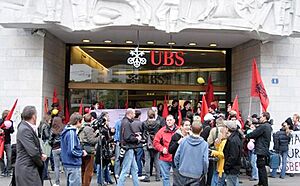
In early 2007, UBS was one of the first major banks to announce big losses in the subprime mortgage market. In May 2007, UBS closed its Dillon Read Capital Management division, which had also suffered losses. These problems led to changes in leadership at UBS.
The bank's losses continued to grow in 2008. UBS announced that it was writing down another $19 billion in mortgage-related investments. By this point, UBS's total losses in the mortgage market were over $37 billion. To deal with these losses, UBS raised new capital. In December 2007, it raised $11.5 billion, with a large part coming from the Government of Singapore Investment Corporation.
In October 2008, UBS received CHF 6 billion in new capital from the Swiss Confederation. The Swiss National Bank and UBS also agreed to move about $60 billion of hard-to-sell assets from UBS to a separate fund. In February 2009, UBS reported a loss of nearly CHF 20 billion (about $17.2 billion) for 2008, which was the biggest single-year loss in Swiss history. During the 2008 financial crisis, UBS wrote down over $50 billion from subprime mortgage investments and cut more than 11,000 jobs.
By spring 2009, UBS announced a new management plan to become profitable again. It cut 8,700 jobs and introduced a new way to pay bonuses, holding back part of the cash bonus and using stock-based incentives. In April 2009, UBS sold its Brazilian financial services business, UBS Pactual, for about $2.5 billion.
The Swiss government sold its stake in UBS in late 2008 at a profit. UBS also raised $3.5 billion from large investors in mid-2009. The bank's CEO, Oswald Grübel, stated that UBS was building a new bank that would operate with high standards and integrity, focusing on wealth management, investment banking, and asset management.
Focus on Private Banking: 2010–2022
In August 2010, UBS launched a new advertising campaign with the slogan "We will not rest." It also sponsored Formula One. In October 2010, UBS's private bank reported new funds coming in, showing a return to profitability. UBS continued to cut jobs to improve efficiency.
On September 15, 2011, UBS discovered a massive loss, initially estimated at $2 billion, due to unauthorized trading by Kweku Adoboli, a trader in the investment bank. Adoboli was arrested and charged with fraud. UBS's actual losses were confirmed to be $2.3 billion. On September 24, 2011, CEO Oswald Grübel resigned, and Sergio Ermotti took over temporarily.
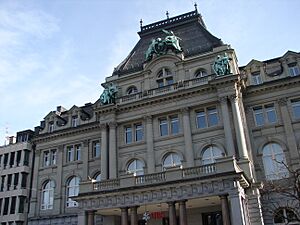
On October 30, 2012, UBS announced it would cut 10,000 jobs worldwide to reduce its investment banking operations. This cut reduced the total staff from 63,745 to 54,000. UBS also decided to focus its investment bank on its traditional strengths and exit some less profitable trading businesses. In December 2012, UBS was fined $1.5 billion for its role in the Libor scandal, where it was accused of trying to manipulate interest rates. In November 2014, UBS and other banks were fined for currency manipulation.
By January 2014, UBS became the largest private banker in the world, managing $1.7 trillion in assets. In May 2015, UBS planned to sell its Australian private banking division.
In late 2016, the bank created a digital currency called "Utility Settlement Coin" (USC) to speed up bank settlements. It also opened a blockchain technology research lab in London. From 2012 to 2018, the investment bank went through a major reorganization, cutting over 10,000 employees and focusing on European business. In January 2018, UBS stated it does not trade or expose clients to cryptocurrencies because it believes they are too speculative. It also partnered with IBM to launch a blockchain trade finance platform called "Batavia" in early 2018.
In April 2021, UBS reported a $774 million loss from the collapse of a US investment fund. In July 2021, during the COVID-19 pandemic, UBS announced it would continue to allow many employees to work flexibly and remotely. This set it apart from some competitors who wanted employees back in the office.
In January 2022, UBS agreed to buy Wealthfront for $1.4 billion to grow its presence in the US. However, this acquisition was later canceled in September 2022. Instead, UBS invested in Wealthfront shares. In November 2022, Colm Kelleher stated that UBS was "very pro-China," despite some warnings about reading too much foreign news about China.
Acquisition of Credit Suisse: 2023
In March 2023, UBS agreed to buy Credit Suisse, one of its main competitors, for $3.25 billion (CHF 3 billion). This was an emergency rescue deal. On March 29, 2023, Sergio Ermotti returned as CEO, replacing Ralph Hamers. UBS completed the acquisition on June 12, 2023.
In July 2023, UBS was fined by the Federal Reserve and the Bank of England for Credit Suisse's past issues with risk management. In August 2023, UBS reached a settlement with the US Justice Department regarding past allegations of fraud related to mortgage offerings.
The new combined bank is very large in Switzerland, handling a significant portion of deposits, corporate loans, and mortgages. UBS plans to keep Credit Suisse's Swiss business but will stop using the Credit Suisse brand. UBS aims to cut costs by $10 billion. By late August 2023, money outflows from Credit Suisse had stopped.
In early September 2023, UBS saw its stock value increase, showing it had profited from the takeover. From April to July, UBS made a record profit of CHF 29.2 billion. This profit came from the difference between the price paid for Credit Suisse and the higher value of its assets.
In May 2025, UBS agreed to pay $511 million to settle a U.S. Department of Justice investigation into Credit Suisse's past actions. This settlement included a guilty plea from Credit Suisse Services AG for helping wealthy Americans hide money in offshore accounts.
How UBS Grew Through Mergers
UBS today is a result of many companies joining together, some dating back to the 1800s. These companies merged to form the three main banks that became UBS: Union Bank of Switzerland, Swiss Bank Corporation, and Paine Webber.
(Formed 1998 from merger of Union Bank of Switzerld & Swiss Bank Corp.) |
|
|||||||||||||||||||||||||||||||||||||||||||||||||||||||||||||||||||||||||||||||||||||||||||||||||||||||||||||||||||||||||||||||||
Leadership at UBS
Current Leaders
- Chairman: Colm Kelleher (since April 2022)
- Chief Executive: Sergio Ermotti (since April 2023); he received SFr14.9 million ($16.8 million) in compensation in 2024, making him Europe's highest-paid bank executive.
Past Chairmen
- Mathis Cabiallavetta (1998)
- Alex Krauer (1998–2001)
- Marcel Ospel (2001–2008)
- Peter Kurer (2008–2009)
- Kaspar Villiger (2009–2012)
- Axel Weber ( 2012–2022)
Past Chief Executives
- Marcel Ospel (1998–2001)
- Peter Wuffli (2001–2007)
- Marcel Rohner (2007–2009)
- Oswald Grübel (2009–2011)
- Sergio Ermotti (2011–2020)
- Ralph Hamers (2020–2023)
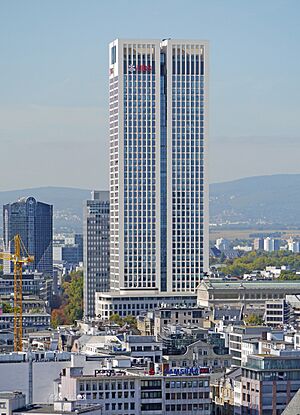
The biggest shareholders of UBS include GIC Private Limited (7.07%), BlackRock Inc (4.98%), and Norges Bank (3.30%). In 2008, during the financial crisis, GIC Private Limited invested CHF 11 billion in UBS to help it, becoming the largest single shareholder.
Other important shareholders include Chase Nominees Ltd, DTC (Cede & Co.), and Nortrust Nominees Ltd.
Keeping Information Private
UBS often talks about Swiss culture—especially its focus on privacy, security, and neutrality—as a key part of its company. Banking secrecy started in the 1700s in Switzerland. Laws were made in the late 1800s and 1930s to protect banks. The most important was the "Banking Law of 1934." This law makes it illegal to share client information with others. This law was passed to prevent client assets and information from being taken.
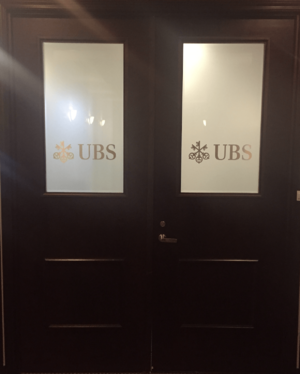
UBS, like other Swiss banks, has very strict rules about keeping client information private. This means employees cannot discuss client activities publicly or share information across borders. They must also keep client information secure. In 2018, UBS Switzerland AG was ranked first on the Financial Secrecy Index for its strong privacy.
Bank Vaults and Bunkers
UBS, and other Swiss banks, own and operate secret bank vaults and underground bunkers. These are used to store gold bars, diamonds, cash, and other valuable items. The exact locations of these facilities are not public, but they are known to be in the Swiss Alps. These places are not subject to the same banking rules as regular banks and do not have to report what they hold to regulators.
According to the Swiss Armed Forces, UBS bought four old military bunkers in the 1980s and 1990s to turn them into storage facilities. Three of these bunkers can only be reached by aircraft. Transferring assets to these bunkers requires special security clearance. The largest known Swiss bank vault is five floors (19 meters) under the bank's Geneva headquarters. In July 2013, UBS also opened a gold storage facility in Singapore for very wealthy clients in Asia.
Research and New Ideas
Blockchain Technology
UBS has been quick to use blockchain technology in financial services. In April 2015, UBS opened an innovation lab in London. In August 2016, UBS announced it would work with other banks to promote its "Utility Settlement Coin" (USC). The USC is a digital currency based on blockchain that banks can use to trade securities faster.
In 2021, UBS bought 31% of ICO Markets Exchange Clearing Limited, a Digital Asset Exchange and Regulator Company in the European Digital Asset Market. This will help financial institutions and private clients trade securities more easily.
Artificial Intelligence
In 2018, UBS created a digital copy of Daniel Kalt, one of its chief economists. An Artificial intelligence company called FaceMe helped create an interactive avatar of Kalt. This avatar can meet with clients through a television screen. Clients can ask questions and get answers, thanks to IBM's Watson AI technology.
Awards and Recognition
UBS has received many awards over the years.
- From 2006, UBS was named one of the "100 Best Companies for Working Mothers" in the U.S. by Working Mother magazine.
- It is part of the Stonewall Diversity Champions scheme, supporting diversity.
- In 2008, Business Week listed UBS among "The Best Places to Launch a Career."
- For many years, UBS topped the charts in Institutional Investor's ranking of Europe's most respected equity analysts.
- In 2010, UBS Investment Bank was voted the leading European brokerage firm for equity research for the tenth year in a row.
- From 2013 to 2016, UBS Wealth Management was voted the Best Global Private Bank by Professional Wealth Management. It also won "Best Private Bank in Asia" for several years.
- In 2014, Euromoney gave UBS awards for Best global bank and Best Bank in Switzerland.
- In 2018, RobecoSAM, a group focused on Sustainability Investing, named UBS a leader in "Diversified Financials" for its efforts in sustainable investing and community work.
- Global Finance named UBS the Best Private Bank in the World in 2017 and one of the World's Best Investment Banks in 2017.
- In 2019, UBS was listed as one of the "Top 50 World's Most Attractive Employers" by Universum Global Survey.
Sponsorships
Sports
UBS supports many sports events, including golf tournaments, cross-country skiing in Switzerland, and ice hockey. UBS was also a sponsor of the Alinghi sailing ship, which won the Americas Cup in 2003.
- Alinghi
- Arnold Palmer Invitational
- Athletissima
- Automobile Club de Monaco
- Faldo Series Asia
- Formula One
- Greifenseelauf
- Hahnenkamm Races
- Hong Kong Rugby Football Union
- New York Islanders
- Olympic Museum Lausanne
- The Players Championship
- Sierre-Zinal Mountain Race
- Spengler Cup Davos
- Swiss Athletics Federation
- UBS Arena, Elmont, NY
- UBS Hong Kong Open
- UBS Japan Golf Tour Championship
- UBS Kids Cup
- Weltklasse Zürich
Culture
UBS also sponsors cultural events, especially classical music and contemporary art. They also support film festivals and music festivals. UBS supported the Guggenheim UBS MAP Global Art Initiative, which helped artists from different parts of the world share their work.
- Art Basel
- Art Basel Miami Beach
- Art Gallery NSW
- Ballett Zürich
- Basel Sinfonietta
- Beijing Music Festival
- Boston Symphony Orchestra
- Bregenz Festival
- Casals Festival
- Cy Twombly exhibition
- Deichtorhallen
- Fondation Beyeler
- Fondation Pierre Gianadda
- Fresh Paint Contemporary Art Fair, Tel Aviv
- Galleria d'Arte Moderna, Milan
- Guggenheim UBS MAP Global Art Initiative
- International Mozarteum Foundation
- Locarno International Film Festival
- London Symphony Orchestra
- Louisiana Museum of Modern Art
- Lucerne Festival
- Lucerne Symphony Orchestra
- Lugano Festival
- Montreux Jazz Festival
- New National Museum of Monaco
- Ravinia Festival
- Rheingau Musik Festival
- Sydney Theatre Company
- Singapore Sun Festival
- Swiss Institute Contemporary Art New York
- Thunerseespiele
- Utah Symphony
- Verbier Music Festival
- WOMEN: New Portraits by Annie Leibovitz
- Zurich Opera
Naming Rights
UBS has the naming rights to UBS Arena, which is the home of the New York Islanders ice hockey team.
See also
 In Spanish: UBS para niños
In Spanish: UBS para niños
- Banking in Switzerland
- Systemically important financial institution
- Swiss Financial Market Supervisory Authority
- UBS 100 Index
- UBS Securities, China branch
 | Delilah Pierce |
 | Gordon Parks |
 | Augusta Savage |
 | Charles Ethan Porter |


